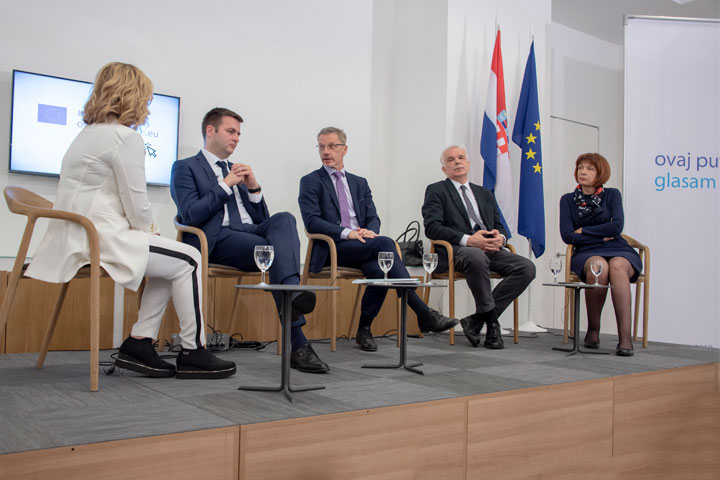
CNB Governor Vujčić participated in the forum on the date of the adoption of the euro in Croatia, organised as part of the Eurotribina series by the Croatian Radio and Television on 30 April in the House of Europe in Zagreb. Speaking on the euro adoption, Governor Vujčić said: "We are holding talks with the European Commission, the European Central Bank and our European partners; there are a lot of preparatory activities we have to carry out in order to be able to enter the European Exchange Rate Mechanism (ERM II). A step towards this goal is a letter to be submitted to the Eurogroup, signed by the minister of finance and me, which will express Croatia's wish to enter the ERM II and its readiness to assume certain obligations. This primarily refers to close cooperation, which de facto means entering the banking union and transferring supervisory powers to the ECB. The letter will be sent once we agree with our European partners on the mutually acceptable content, about which discussions are now taking place."
Governor Vujčić went on to add: "The Croatian National Bank conducts a semi-annual opinion poll on the adoption of the euro, using a representative national sample. According to the poll, 52 percent of the citizens are in favour of the adoption of the euro, while 40 percent are against it. Three quarters of those against the adoption cite the alleged sharp price increase after the adoption of the euro as the main reason for their being opposed to it. This argument is nothing but a myth: none of the countries that have adopted the euro have seen a major price increase, which is also confirmed by official statistics. The effect of the adoption of the euro has often been confused with the long-term inflation effect; over the past twenty years we have seen price increases in Croatia although we have not adopted the euro. There is always inflation; in other words, prices will rise after the adoption of the euro irrespective of the change of the national currency." Governor Vujčić also commented on the high public support for the euro in the countries that adopted it over the last decade: "Latvia, for example, introduced the euro five years ago; the public support before the country's entry to the eurozone was rather low, below 40 percent, whereas today 75 percent of Latvians are satisfied with the euro. Also, even two thirds of Greeks are in favour of the euro, which is probably surprising given the severe near-collapse financial crisis that Greece has recently gone through."
"Croatia is the smallest of the EU countries that have not yet adopted the euro, and a country that would derive most benefits from its adoption due to its being highly euroised, a fact that sets it apart from other EU countries that are still outside the eurozone. Most deposits are in euro, so that most loans are euro-indexed. Hence the high foreign exchange risk, which is reflected in investment insecurity, higher interest rates and high transaction costs. The euro will make the country more attractive for investments by the eurozone countries. This is because it is precisely the exchange rate that poses a major risk for investors as, for example, the conversion of a 100 million euro with the kuna depreciating 10 percent would result in a 10 million euro loss," the Governor explained.
In response to the questions on the exchange rate for the conversion of the kuna to the euro on Croatia's entry to the eurozone the Governor said that one should not expect a significant deviation in the exchange rate given its twenty-five year stability, adding that Croatia could not enter the eurozone before 2023.
Also participating in the forum were Tomislav Ćorić (Government of the Republic of Croatia), Mladen Vedriš (Zagreb Faculty of Law) and Gordana Deranja (President of the Croatian Employer's Association). The moderator was Eliana Čandrlić Glibota, Editor-in-Chief of the Croatian Radio.
